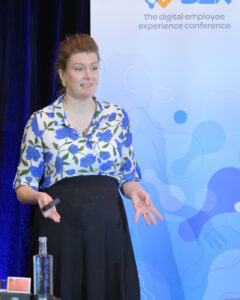
Map from Shutterstock
Filed under: Articles, Intranets, Knowledge management
Staff interviews involve conducting one-on-one discussions with staff throughout the organisation.
These are designed to identify key knowledge needs, gain an understanding of the organisation, and uncover major issues and problems.
As such, this technique is often used in the early stages of projects such as the redevelopment of an intranet, as part of the requirements-gathering activities.
In knowledge management terms, these interviews are also a simple form of ‘knowledge mapping’.
The information gathered can be used to inform the development of an appropriate strategy, whether it is for a knowledge management project, or for an intranet redesign.
Sample questions
- What is your job role?
- How long have you been working for the organisation?
- What are the main activities that make up your job?
- Who do you communicate most frequently with on work matters?
- Do you have policies or guidelines for your work?
- How do you get access to these?
- What information do you rely on during a normal working day?
- Where do you obtain this information from?
- If you have a question, where do you go to find an answer?
- What training or induction did you receive when you started at the organisation?
- What training do you receive within a typical year?
- How do you find out about what’s happening in the organisation?
- Which sources of news do you regularly read?
- What news stories are you most interested in?
These questions are refined case-by-case, based on background research into the nature of the organisation. If there are known issues or areas of interest, these are added to the list of questions.
The questions are also guided by the nature of the project being undertaken.
Critical success factors
There are a number of factors that experience has shown enhance the effectiveness of staff interviews, including:
- Invert the focus: ask about the staff and their activities, instead of asking about IT systems (such as intranets, KM systems, etc)
- Involve a representative cross-section of staff, focusing on actual ‘doers’ instead of managers.
- Use different questions for senior management that focus on their strategic plans, if they are involved.
- Gain an understanding of the real organisation, and avoid gathering opinions about what needs to be done.
- Put the participants at ease, and explain to them what the project is about.
- Explore interesting side-issues as required: don’t stick solely to the script. (That’s why it’s being done face-to-face, not via survey.)
- Use the work environment as cues for questions (such as piles of paperwork, folders in bookshelves, etc).
- Use the opportunity to capture “soundbites”: small snippets of actual quotes, as these are very effective in the final report.
- Give participants an opportunity to ask you questions about the project at the conclusion of the session.
Summary
staff interviews are a simple, but very effective mechanism for gaining an understanding of an organisation, and for identifying staff needs. They can also be viewed as a form of ‘knowledge mapping’ that identifies key knowledge resources within an organisation.





